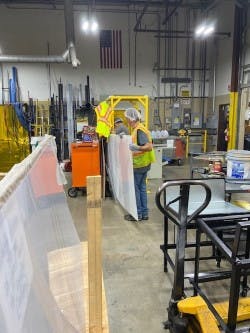By Karen Hanna
Organizations and individuals familiar with Second Chance hiring offer a number of tips for companies interested in hiring formerly incarcerated people. According to “What to know about Second Chance hiring and why it could help solve your labor problems,” an article posted by the U.S. Chamber of Commerce, “There may be some adjustments you need to make to create an inclusive workspace for second chance employees. Second chance hiring is likely to be unsuccessful if you’re doing it for marketing or PR reasons.”
At CKS Packaging, managers are committed to helping people turn their lives around. But Bill Padgett, operations manager of CKS Packaging’s two facilities in Naugatuck, Conn., said he’s also focused on attracting, developing and retaining good workers to meet customers’ needs.
“The bottom line is my job is, from a pure business standpoint, I’ve got to staff the facility with the best people I can find,” he said. “And nowadays, as I’m sure you know, staffing facilities is extremely difficult.”
CKS’ experience with Second Chance hiring over about five years speaks to its approach. Interviews with Padgett and Lloyd Martin, the company’s senior VP of manufacturing, highlighted some key recommendations.
Start small. Companies need to familiarize themselves with the problems workers might face, as well as the resources they might need. This takes a gradual approach. “Don’t try to dive in. Start small. Start with five — that’s what we did. Start with five or 10, and then track how well they’re doing and, if they leave, [find out] why did they leave?” Martin said.
Provide mentorship. CKS’ Second Chance hires had attendance issues, Martin said — until the company put more supports in place. “We’ve learned to put a buddy system together. We’ve learned to follow up with them in the first few weeks, once a week, and ask them, ‘How’s it going? How’s work going? How’s life going? What can we do to help you? What can we do to support you?’ ”
Build partnerships. CKS has discovered that issues like finding housing and reliable transportation require outside help, and it’s still growing its network of resources. Outside partners could include churches, community groups, homeless shelters and national organizations that have a specific focus on Second Chance programs, like 70 Million Jobs and the Second Chance Business Coalition. The Manufacturing Institute and Society for Human Resource Management also provide information tools.
Commit to a fresh start. CKS’ employees have rallied to help their colleagues and have embraced the company’s Second Chance hiring program, Martin said. But the details of individual employees’ past issues should be kept confidential. “That’s water under the bridge. That’s done,” he said. “They’ve paid their time.”
Read more about CKS Packaging's program here. And find out about a worker, Chaz Arvanites, who has thrived in his chance at a second shot.
Karen Hanna, senior staff reporter
About the Author
Karen Hanna
Senior Staff Reporter
Senior Staff Reporter Karen Hanna covers injection molding, molds and tooling, processors, workforce and other topics, and writes features including In Other Words and Problem Solved for Plastics Machinery & Manufacturing, Plastics Recycling and The Journal of Blow Molding. She has more than 15 years of experience in daily and magazine journalism.
